Dear Reader, in this age of AI created content, please support with your goodwill someone who works harder to provide the human-made. Sign up at the top of the lefthand column or bottom of this page. You will receive my hand illustrated monthly newsletter RESTORE NATURE and access to the biodiversity garden design course as I write...and nothing else, I respect your time. I am also removing the advertizing as best I can as its become intrusive inappropriate and pays me nothing.
saving soil: no cost,
the simple easy way
If your garden is a desert, saving soil does not require anything more than you putting in less work on what you normally do and saving that effort for new tasks. An article on six principles for regenerating your soil's fertility explains how. But first I will delve into natural additives that help increase your soil organic matter. The first secret of soil health that saves you time is constant cover, with either plants or mulch, which allow oneself and the environment to benefit from healthy soil.
You can also increase the life in your soil with other home made active additives, like the probiotics you take for your own health. These are composting, and vermiculture and then some highly effective magic from permaculture, including nurturing the presence of fungi. Connecting soil fertility and saving water, see the article on our super cheap humanure hack and album of pictures on humanure composting and building a compost toilet, and maximizing your composting space with a pentagonal composter, as well as a method of combining worm farming and gray water recycling. One can also process a lot of organic waste in a biodigester with anaerobic processes. I have discussed some of the types of biodigester. Fertility and water retention is much influenced by your soil type. I've worked a lot with pure sand, and a rock hard mix of shale and clay that makes digging impossible, in both cases you can improve soil with green manures otherwise known as cover crops and growing mushrooms outside in garden beds.
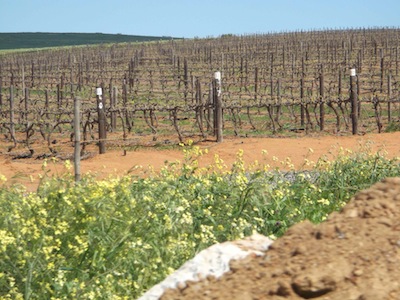 bad soil practice, naked soil, present drought creator and future desert
bad soil practice, naked soil, present drought creator and future desertSaving soil saves your back too
If at the moment you are digging and weeding till your back breaks and watering the soil, to no avail because it remains as dry looking as the Sahara... just stop... do not dig, weed, or water. Do this instead:
!) Go out and collect organic material, anything you can find it really does not matter
2) Put it on your garden 10 cm to 20 cm deep, not just on the beds, on the paths, the open areas, on everything.
 cover every inch with living plants or mulch (dead plants)
cover every inch with living plants or mulch (dead plants)3) Do not leave an inch of naked soil anywhere. Especially where you are currently sowing seeds.
4) Every year put organic material on your garden again, 10-20 cm deep. It is called 'mulch'. It is the basis of good gardening. Without it you can put away your tools.
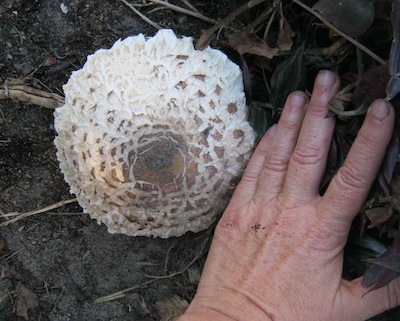 rejoice in mushrooms, they show your soil lives
rejoice in mushrooms, they show your soil livesSaving soil is free
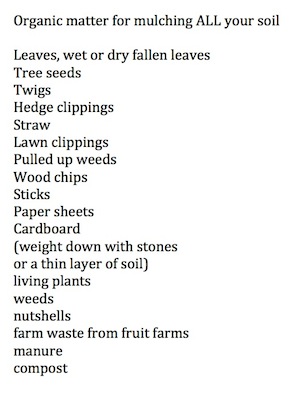
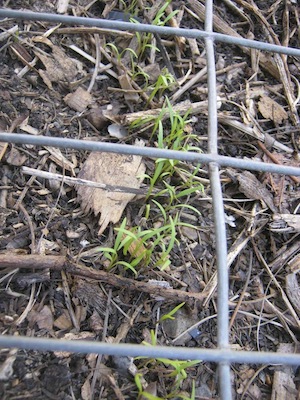 carrot seed emerging through mulch
carrot seed emerging through mulchWhat is called 'mulch'
applied every year, is saving soil
5) Mulch is not compost, it is un-decomposed organic material, straight from the tree or the garden refuse bag. It need not be fine like it is in the picture books. That is only to make it pretty. You could cover the ground with logs, but it would be uncomfortable walking. However, cover the ground. Cover it completely.
5) Materials for mulch are anything organic, twigs, dead plants, lawn clippings are excellent. When you sweep up leaves, put them on the garden, when your neighbours do not sweep up their leaves, count it all joy, sweep them up and put them on your garden. Straw, wood-chips old weeds or hedge clippings...everything is mulch
6) Now that you have covered your soil you can start gardening. You can think about irrigation, sowing and compost. But first cover the soil, and allow the covering to start regenerating the soil.
7) Without the covering of mulch, your soil dies. That is why it looks like it does in the picture below of a local garden.
8) The more you 'garden' if you understand gardening to mean digging, weeding and watering, the more you kill your soil with each day of loving care you spend on it.
So much 'gardening' to get this ?
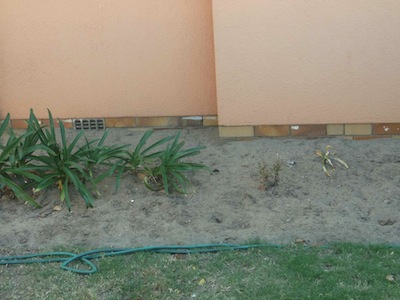 |
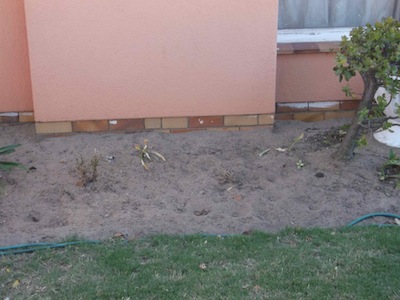 |
Why ?
Why saving soil requires applying thick layers of organic matter
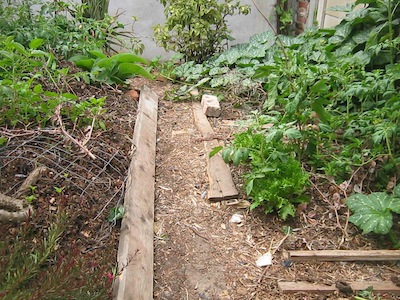 under layer of cardboard, mulch on beds and paths, and you need less water and weeding and food plants thrive
under layer of cardboard, mulch on beds and paths, and you need less water and weeding and food plants thriveOrganic matter protects
Organic matter prevents the soil from drying out. And from wind. Under the mulch in the moist atmosphere, in the presence of organic matter, soil bacteria, fungi and other organisms grow.
Soil bacteria
Organic matter is food for soil bacteria. Without it they cannot survive or multiply. Soil bacteria digest the organic matter and make it available to your plants as nutrients, but they do something else which is more important. They help create humus. Humus is made from the dead and living bodies of tiny soil organisms and organic matter. Humus is like a sponge. It sucks up and retains things like water and nutrients. Without humus, especially in sandy soil, the water and nutrients very soon drain away, leaving nothing for your plant roots to live on. Humus also gives the soil the right 'crumb' structure. This means that water soaks into it and wets it properly. Water just runs off dry soil. It also means the soil is loose and the roots can move easily through the soil searching for nutrients and water.
Soil fungi
Organic matter especially woody and stalky material is enjoyed by fungi. Fungi have networks beneath the soil for feeding themselves. These help plants to exchange nutrients and levels the nutrient playing field in your garden. Without fungi your soil is not truly healthy, when you see mushrooms, rejoice.
Weeding destroys
If you pull up weeds and replace them with nothing for weeks, you have removed the skin of your soil, the protective layer and like a human without skin, it will lose water, and life in it will die. That life in the soil sustains your food plants.
Digging destroys
When you dig and turn the soil, you take all the life in your soil, thriving in the oxygen rich top twenty centimetres and bury it where there is no air. You also take this moist living layer and expose some of it to the sun where the sun's rays sterilize it and dry it out. Soon, with much tilling, your soil will be sterile. It will remain sterile until several weeks after you add organic matter again. Digging kills everything in your soil. It should only be used if you have a problem with pathogens.
Watering naked earth destroys
When you water naked sand you leach all the nutrients it does have out of it, and cause erosion. Only water when you have organic matter or plants on or in your soil. Till then you are damaging it with watering.
in a nutshell
Stop digging, weeding and watering without need. Only weed when you are going to plant something the same week, only dig when you have a soil infection or pathogen and only water when there are plants or organic matter in or on your soil. Instead of all this 'gardening' spend effort on collecting bags of organic matter and scattering it 10cm deep over every inch of the garden. Mulching is the basis of saving soil.
only after saving soil:
After you have applied the six principles for creating living soil, and followed through with the importance of perennial plantings for soil health, you can enjoy the benefits of healthy soil. In the meantime, have you protected your soil with organic mulch ? You will find yourself doing less 'gardening' and more water-wise practice, and you will have the spare energy to learn about other fertility treatments for your soil like composting: organic or hot, aerobic, and anaerobic composting, how to make vermicompost, a worm-culture expert, green fertilizers, liquid plant based fertilizer, and modeling your soil treatment on nature.
Return from Saving Soil to the Sitemap
------
home page for useful information on gardening the low cost eco-friendly restorative way
------
You’re a home gardener ! Share your experiences and questions !
We all know about home gardening. Tell us about your successes, challenges and ask about issues that bother you. You may have the luxury of a back garden, but there are other ways we learn. Few people age without growing something or buying vegetables during their lives ! It is absolutely guaranteed that you have learned things which can help others on their gardening journey.
We invite you to share your stories, ask questions, because if a thing has bothered you it will bother others too. Someone may have a solution ! No question is too small. There is learning for everyone involved, for you, for me (yes, I learn from every question), for us all. Exciting stuff !
We are starting on a new journey. Every week we will profile your letters ! The best stories and questions we receive.
What Other Visitors Have Said
Click below to see contributions from other visitors to this page...
it is so easy to save this soil and bring it back to life Not rated yet
A garden in the neighbourhood where gardeners have expended work, its so sad. Mulch is free, in every gutter in every street in this area there are inches …
Restore Nature Newsletter
I've been writing for four years now and I would love to hear from you
Please let me know if you have any questions, comments or stories to share on gardening, permaculture, regenerative agriculture, food forests, natural gardening, do nothing gardening, observations about pests and diseases, foraging, dealing with and using weeds constructively, composting and going offgrid.
SEARCH
Order the Kindle E-book for the SPECIAL PRICE of only
Prices valid till 30.09.2023
Recent Articles
-
garden for life is a blog about saving the earth one garden at a time
Apr 18, 25 01:18 PM
The garden for life blog has short articles on gardening for biodiversity with native plants and regenerating soil for climate amelioration and nutritious food -
Cape Flats Sand Fynbos, Cape Town's most endangered native vegetation!
Apr 18, 25 10:36 AM
Cape Flats Sand Fynbos, a vegetation type found in the super diverse Cape Fynbos region is threatened by Cape Town's urban development and invasive alien plants -
Geography Research Task
Jan 31, 25 11:37 PM
To whom it may concern My name is Tanyaradzwa Madziwa and I am a matric student at Springfield Convent School. As part of our geography syllabus for this
"How to start a profitable worm business on a shoestring budget
Order a printed copy from "Amazon" at the SPECIAL PRICE of only
or a digital version from the "Kindle" store at the SPECIAL PRICE of only
Prices valid till 30.09.2023








